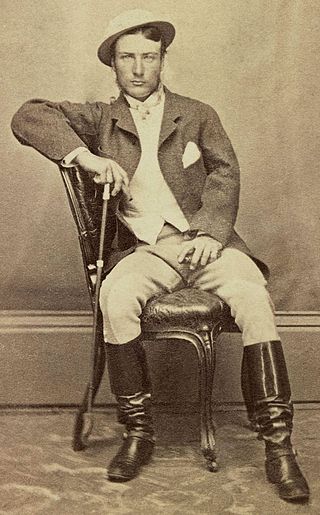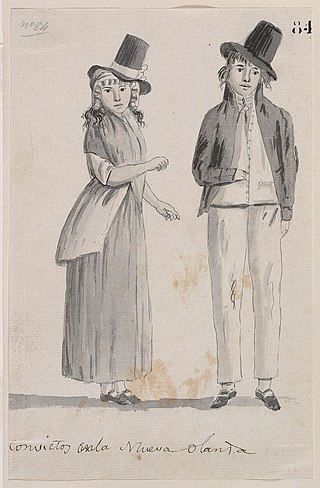Related Research Articles

Marcus Andrew Hislop ClarkeFRSA was an English-born Australian novelist, journalist, poet, editor, librarian, and playwright. He is best known for his 1874 novel For the Term of His Natural Life, about the convict system in Australia, and widely regarded as a classic of Australian literature. It has been adapted into many plays, films and a folk opera.

Colin Friels is a Scottish-born Australian actor of theatre, TV, film and presenter.

Between 1788 and 1868 the British penal system transported about 162,000 convicts from Great Britain and Ireland to various penal colonies in Australia.

For the Term of His Natural Life is a story written by Marcus Clarke and published in The Australian Journal between 1870 and 1872. It was published as a novel in 1874 and is the best known novelisation of life as a convict in early Australian history. At times relying on seemingly implausible coincidences, the story follows the fortunes of Rufus Dawes, a young man transported for a murder that he did not commit. The book clearly conveys the harsh and inhumane treatment meted out to the convicts, some of whom were transported for relatively minor crimes, and graphically describes the conditions the convicts experienced. The novel was based on research by the author as well as a visit to the penal settlement of Port Arthur, Tasmania.

Matilda Mary Devine, known as Tilly Devine, was an English Australian organised crime boss. She was involved in a wide range of activities, including sly-grog, razor gangs, and prostitution, and became a famous folk figure in Sydney during the interwar years.
For the Term of His Natural Life is a 1927 Australian film based on the 1874 novel by Marcus Clarke, directed, produced and co-written by Norman Dawn. It was the most expensive Australian silent film ever made and remains one of the most famous Australian films of the silent era.

Alfred Rolfe, real name Alfred Roker, was an Australian stage and film director and actor, best known for being the son-in-law of the celebrated actor-manager Alfred Dampier, with whom he appeared frequently on stage, and for his prolific output as a director during Australia's silent era, including Captain Midnight, the Bush King (1911), Captain Starlight, or Gentleman of the Road (1911) and The Hero of the Dardanelles (1915). Only one of his films as director survives today.

For the Term of His Natural Life is a 1908 Australian silent film based on the 1874 novel by the same name by Marcus Clarke. The film is an adaptation of MacMahon's stage adaptation of the novel.
Charles Cozens Spencer was a British-born film exhibitor and producer, who was a significant figure in the early years of the Australian film industry. He produced films under the name Spencer's Pictures and was an early backer of the films of Raymond Longford. He was also instrumental in the creation of "The Combine".

Captain Midnight, the Bush King is a 1911 Australian silent Western film about the fictitious bushranger Captain Midnight. It was the directorial debut of actor Alfred Rolfe. The film is based on the play of same name by W. J. Lincoln and Alfred Dampier. Captain Midnight, the Bush King is now considered lost.
The Life of Rufus Dawes is a 1911 Australian silent film based on Alfred Dampier's stage adaptation of the 1874 novel For the Term of His Natural Life produced by Charles Cozens Spencer.

The Lady Outlaw is a 1911 Australian silent film set in Van Diemen's Land during convict days.

Katherine Annabel Lily Dampier, known as Lily Dampier, was an Australian actress of stage and screen. She was the daughter of Alfred Dampier and married to Alfred Rolfe.

Jessica Harcourt (1905–1988) was an Australian mannequin, author and actress, best known for playing a leading role in For the Term of His Natural Life (1927).
Filmco was an Australian investment company used by producers to raise funds to invest in Australian movies. It flourished during the 10BA era.
A convict melodrama is a type of melodrama set in Australia during the convict era. They normally revolved around stories of innocent people wrongly accused of a crime who were transported to Australia as convicts. The best known work in this field was the novel For the Term of His Natural Life, which was adapted into various plays and films.
The Last Outlaw is a 1980 Australian four-part television miniseries based on the life of Ned Kelly. It was shot from February to May 1980 and the end of its original broadcast, in October–November 1980, coincided with the centenary of Ned Kelly's death.
Criminal activity in New South Wales, Australia is combated by the New South Wales Police Force and the New South Wales court system, while statistics about crime are managed by the Bureau of Crime Statistics and Research. Modern Australian states and cities, including New South Wales, have some of the lowest crime rates recorded globally with Australia ranked the 13th safest nation and Sydney ranked the 5th safest city globally. As of September 2018 the City of Penrith (475.7) and City of Blacktown (495.1). Rural areas have comparatively high crime rates per 100,000 with rural shires such as Walgett Shire (1350.3) and Moree Plains Shire (1236.2) having some of the highest violent crime rates in the state. The overall NSW crime rate has been in steady decline for many years.
For the Term of His Natural Life is a 1935 Australian radio serial based on the novel of the same name by Marcus Clarke.
For the Term of His Natural Life is an 1886 Australian stage play adaptation of the novel For the Term of His Natural Life.
References
- 1 2 Ed. Scott Murray, Australia on the Small Screen 1970-1995, Oxford Uni Press, 1996 p196
- 1 2 "Even the bowler hat has gone". The Sydney Morning Herald. 29 September 1981. p. 2.
- ↑ "How film investors found themselves in a foxhole". The Sydney Morning Herald Good Weekend. 30 March 1985. p. 7.
- ↑ "Couple produces without backing". Daily Record. 1 November 1982. p. 23.
- ↑ "The Term of His Natural Life". The Australian Women's Weekly . National Library of Australia. 13 January 1982. p. 96. Retrieved 15 July 2013.
- ↑ "I'm going to be an actor... not a star". The Sydney Morning Herald. 17 January 1982. p. 54.
- ↑ For the Term of His Natural Life app accessed 14 July 2013
- ↑ "Top Mini series of all time". Screen Australia.
- ↑ Sadlier, Kevin. "Death of the Australian mini-series". Sydney Sun Herald. p. 47.
- ↑ "Term: soapy but lacking the harsh reality of history". The Sydney Morning Herald. 22 May 1983. p. 54.
- ↑ "Disney version of Clarke novel". The Age. 23 May 1983. p. 2.
- ↑ "Fair stinkum". The Guardian [London]. 17 June 1985. p. 9.